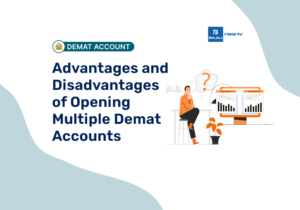Demat Account – What You Need to Know Before You Start Trading
Last Updated on March 12, 2024 by ethinos

You have to open a Demat account if you want to trade in the markets of equity. In India, the Securities and Exchange Board of India (SEBI), the chief regulatory authority of the Indian financial markets, has made this mandatory. Today, with seamless online processes, it is very easy to open a Demat account on a portal of a depository participant (DP), that is, a registered brokerage or a bank.
However, before you consider some aspects of trading with a Demat account, you must know what it is and how it functions to facilitate your trading activity.
Table of Content [hide]
Open a Demat Account – Things to Know
A Demat account is essentially where you store your securities in digital or electronic format. A Demat account can store your securities like stocks, bonds, ETFs, mutual funds, etc, safely without you having to bother about damage or loss. Typically, when you open a Demat account, you also have to open a trading account if you wish to trade in securities, that is, buy and sell them. A Demat account and a trading account are linked. In turn, these two are linked to your bank account.
The reason why the accounts are linked is that you can trade smoothly. Say, you want to buy stocks. You can do so online and the funds from your bank account get debited for stock purchase while the trading account lets you buy the stocks. The stocks that are bought are then stored in your Demat account. Similarly, when you sell your shares, they are debited from your Demat account and the proceeds are deposited in your bank account automatically.
Now, that the Demat account meaning is clear to you, you can grasp some considerations while operating a Demat account.
Some Considerations Before Trading
When you open a Demat account online, there are key things to consider before you actively start trading with a Demat account. These are considerations to keep your trading and the operation of your Demat account smooth. Here are some of the things you should keep in mind:
Demat and Trading Account with One Broker
Your Demat and trading accounts should be opened with the same broker. Typically, both accounts are opened at the same time. When your broker is your DP and is licensed to trade on your behalf, the whole trading activity becomes seamless and you can monitor it and keep track of trading. Your trading as well as storage becomes hassle-free.
Additional Read: Roles and Functions of Sub-Broker in India
Check the Strength of the Demat Platform
Before you open a Demat account, checking the DP’s platform is essential for future smooth operation of your accounts. These days, your Demat account and your trading account are present and operate on a single platform. Due to this, trading, depositing of funds, debiting of funds, and depositing and debiting of securities all take place electronically and smoothly. Ensuring that your DP runs accounts with the latest technology on offer gives you the seamless experience you want and safe and secure trading. It is also important to know when credits to your accounts happen, such as the credit of securities and funds.
Check Charges Related to Your Demat Account
You may regularly see that DPs offer you the opening of a Demat account free of cost. While this may be attractive to investors, this is just a single cost of having a Demat account and maintaining it. You may open a Demat account free of charge, but there are other costs involved with a Demat account. These are in the form of the AMC, or Annual Maintenance Charge, and the transaction charge. The annual maintenance charge is the fee your broker charges to maintain your account and is charged according to the value of securities in the Demat account. Transaction charges are charged whenever you buy and sell your securities.
Besides the charges already mentioned, your broker typically levies charges for physical statements, statements of transactions and holdings, etc.
Ancillary Services
Your DP is not just responsible for undertaking trading on your behalf. When you open a Demat account, the Demat account meaning translates to all the services your broker can provide with your Demat account. This includes support services as well. Check if your broker handles complaints effectively, how long it takes to get physical shares dematerialised, etc.
Smooth Services
In any online financial services, such as the debit and credit of funds, payment gateways are involved. Several brokers charge for the use of payment channels, but typically if you use NEFT, UPI, RTGS, or any other registered gateway, there are no costs involved.
Final Thoughts
Your Demat account is your path to trading and investing. You would like the whole process of investing and trading to go smoothly, and to ensure this happens, you should consider a few important things before you start trading with a Demat account. Today, everyone looks for a hassle-free way to trade and transact and the only way to do this is to be cautious yourself.
Disclaimer: Investments in the securities market are subject to market risk, read all related documents carefully before investing. This content is for educational purposes only.

